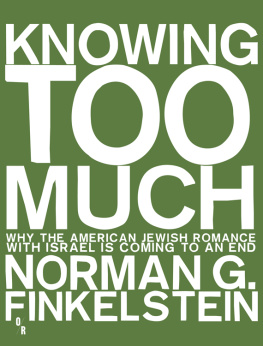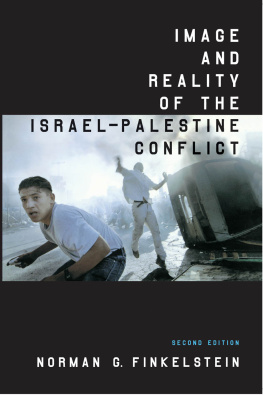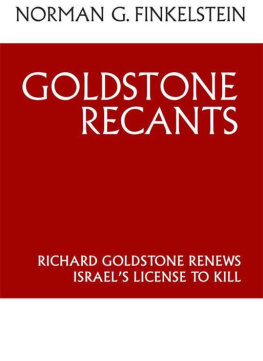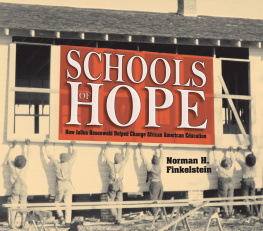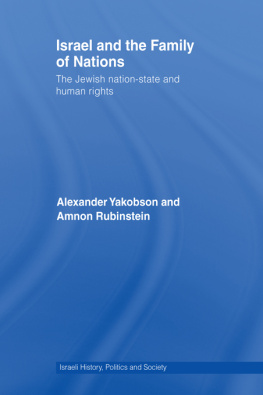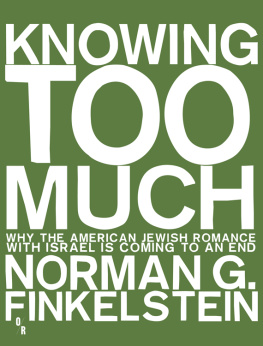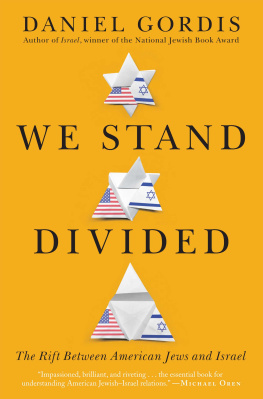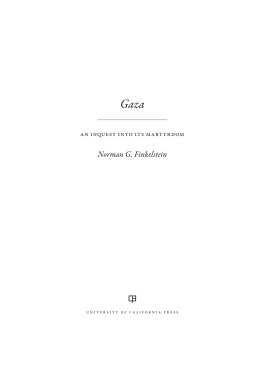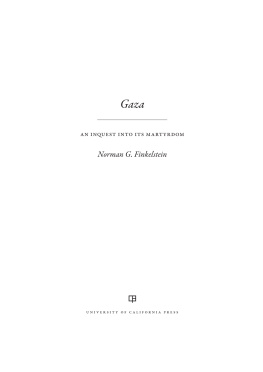NOTES
EPIGRAPHS
Noam Sheizaf, Our Brothers, Ourselves, Haaretz (1 April 2011).
Dana Goldstein, Why Fewer Young American Jews Share Their Parents View of Israel, Time (29 September 2011).
INTRODUCTION
For full bibliographic references, see Theodore Sasson, Charles Kadushin, and Leonard Saxe, American Jewish Attachment to Israel: An assessment of the distancing hypothesis (Steinhardt Social Research Institute: February 2008). Although this particular study disputes what it calls the taken-for-granted thesis of American Jewish distancing from Israel, it nonetheless concedes that for those looking for detachment, there is plenty of evidence to be found.
J Street National Survey of American Jews (28 February-8 March 2009), questions 37, 59.
Ibid., questions 60, 61.
For survey data connecting Jewish opposition to settlements with liberal ideology, see Theodore Sasson et al., Still Connected: American Jewish attitudes about Israel (August 2010), pp. 24-25.
Steven M. Cohen and Ari Y. Kelman, Beyond Distancing: Young adult American Jews and their alienation from Israel (Andrea and Charles Bronfman Philanthropies: 2007), pp. 13-16. Because much has already been written on intermarriage and its impact on American Jewish life, this topic will not be pursued in these pages.
Steven M. Cohen, American Modernity and Jewish Identity (New York: 1983), p. 32 (cf. pp. 154-55).
Nathan Glazer, The Anomalous Liberalism of American Jews, in Robert M. Seltzer and Norman J. Cohen, eds., The Americanization of the Jews (New York: 1995), pp. 141, 143.
Seymour Martin Lipset and Earl Raab, Jews and the New American Scene (Cambridge: 1995), p. 161.
Steven T. Rosenthal, Irreconcilable Differences? The waning of the American Jewish love affair with Israel (Hanover, NH: 2001), Ofira Seliktar, Divided We Stand: American Jews, Israel, and the peace process (Westport, CT: 2002). Other sources of contention between American Jewry and Israel reported in these studies include the Jonathan Pollard spy case and Israels discriminatory definition of Who is a Jew?. For surveys gainsaying a nexus between Jewish liberalism and estrangement from Israel, see Sasson et al., Still Connected, pp. 10-12, 31.
).
Cohen, American Modernity, pp. 162-66; Sasson et al., Still Connected, pp. 11, 29.
Cohen, American Modernity, pp. 162, 166, 167, 170.
Ahad Haam, Slavery as Freedom, in Leon Simon, ed., Selected Essays by Ahad Haam (Philadelphia: 1912), pp. 183-84.
PART I/CHAPTER ONE
Lawrence H. Fuchs, The Political Behavior of American Jews (Glencoe: 1956), pp. 74-76, 104.
Alan M. Fisher, Realignment of the Jewish Vote, Political Science Quarterly (Spring 1979).
Steven M. Cohen, The Dimensions of American Jewish Liberalism (New York: 1989).
Steven M. Cohen and Charles S. Liebman, American Jewish Liberalism: Unraveling the strands, Public Opinion Quarterly, vol. 61 (1997), pp. 417-22. For the checkered history of Jewish support for African-American rights, see Michael E. Staub, Torn at the Roots: The crisis of Jewish liberalism in postwar America (New York: 2002), pp. 112-16.
Steven M. Cohen, American Modernity and Jewish Identity (New York: 1983), pp. 139-43 (quote at p. 143), 151-53.
Seymour Martin Lipset and Earl Raab, Jews and the New American Scene (Cambridge: 1995), pp. 26-28, 168.
The quip originated with American Jewish Committee researcher Milton Himmelfarb (cited by Nathan Glazer, The Anomalous Liberalism of American Jews, in Robert M. Seltzer and Norman J. Cohn, eds., The Americanization of the Jews (New York: 1995), p. 133). For the qualified hypothesis that Jewish voting patterns do in fact correlate with perceived economic self-interest, see Lee Sigelman, If You Prick Us, Do We Not Bleed?, Journal of Politics (November 1991).
Robert Lerner, Althea K. Nagai and Stanley Rothman, Marginality and Liberalism among Jewish Elites, Public Opinion Quarterly (Autumn 1989).
Jerome S. Legge, Jr., Explaining Jewish Liberalism in the United States: An exploration of socioeconomic, religious, and communal living variables, Social Science Quarterly (March 1995), pp. 126, 137.
William Spinrad, Explaining American-Jewish Liberalism: Another attempt, Contemporary Jewry, vol. 1 (1990), p. 115; Cohen, American Modernity, p. 137 (quote).
Lipset and Raab, Jews and the New American Scene, pp. 151-52; Cohen, American Modernity, pp. 24-25.
Norman G. Finkelstein, The Holocaust Industry: Reflections on the exploitation of Jewish suffering (New York: 2000; second paperback edition, 2003), pp. 49-50.
For the classic exposition of this hypothesis, see Fuchs, Political Behavior, pp. 177-203. For a more complex version of this hypothesis, see Geoffrey Brahm Levey, Toward a Theory of Disproportionate American Jewish Liberalism, in Peter Y. Medding, ed., Values, Interests and Identity: Jews and politics in a changing world (Jerusalem: 1995).
Charles S. Liebman, Toward a Theory of Jewish Liberalism, in Donald R. Cutler, ed., The Religious Situation: 1969 (Boston: 1969), pp. 1037-42, 1046-47.
Spinrad, Explaining.
Allon Gal, Preface, in Allon Gal, ed., Envisioning Israel: The changing ideals and images of North American Jews (Detroit: 1996), p. 9.
Leonard Fein, Why Israel is Losing Liberals, Forward (13 February 2009).
Marc Dollinger, Quest for Inclusion: Jews and liberalism in modern America (Princeton: 2000), p. 218.
Inequality in Israeli society has doubled since the 1950s, while fully one-fifth of Israeli families and more than one-third of Israeli children live in poverty. Association for Civil Rights in Israel (ACRI), The State of Human Rights in Israel and the Occupied Territories: 2008 report, p. 53; Asher Arian et al., The 2003 Israeli Democracy Index: Measuring Israeli democracy (Jerusalem: 2003), pp. 7-8; Asher Arian et al., Auditing Israeli Democracy2006: Changes in Israels political party system (Jerusalem: 2006), p. 34; Asher Arian et al., Auditing Israeli Democracy2007: Cohesion in a divided society (Jerusalem: 2007), pp. 70-71. See the ACRI 2008 report, pp. 58ff. for deterioration in workers rights, pp. 63ff. for deterioration in the right to health, pp. 69ff. for deterioration in the right to housing.
Meirav Arlosoroff, Once Politicians Died Poor, Haaretz (8 June 2008).
Jewish People Policy Planning Institute, Annual Assessment 2008 (Jerusalem: 2008), p. 35; Asher Arian et al., Auditing Israeli Democracy2010: Democratic values in practice (Jerusalem: 2010), p. 31.
).
Asher Arian et al., Auditing Israeli Democracy2007, p. 41; Asher Arian et al., Auditing Israeli Democracy2008, pp. 11, 39, 42, 56-57, 78, 113.
Asher Arian et al., Auditing Israeli Democracy2008, pp. 65, 83-84, 121; Asher Arian et al., Auditing Israeli Democracy2009, pp. 61-62, 120; Asher Arian et al., Auditing Israeli Democracy2010, pp. 79, 81.
Asher Arian et al., Auditing Israeli Democracy2008, pp. 65-66.
Asher Arian et al., Auditing Israeli Democracy2007, pp. 46-47, 110; Asher Arian et al., Auditing Israeli Democracy2008, pp. 83, 119 (the results reported on p. 119 of the 2008 survey do not fully jibe with the findings reported in the 2007 survey); Asher Arian et al., Auditing Israeli Democracy2009, pp. 58, 115; Asher Arian et al., Auditing Israeli Democracy2010, pp. 76-77, 174.
Asher Arian et al., Auditing Israeli Democracy2010, pp. 107-8, 183.
Asher Arian et al.,
Next page
